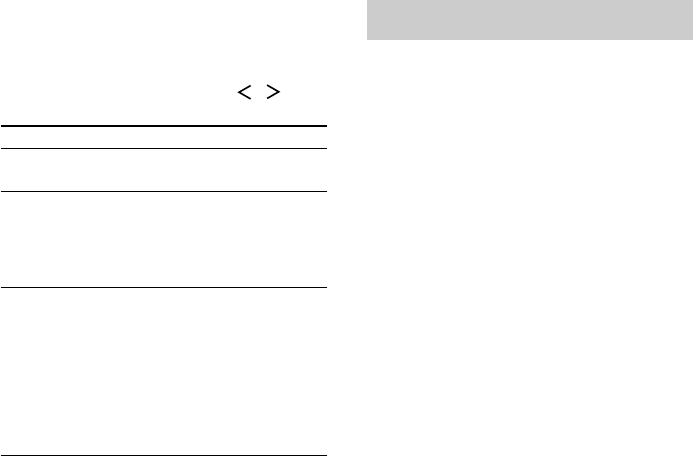
24
x Surround back speaker crossover
frequency (SURR BACK SP >)
Lets you adjust the surround back speaker bass
crossover frequency when the surround back
speaker is set to “SMALL”.
Note
You can set the FRONT, CENTER, SURROUND
and SURR BACK parameters when the speaker size
is set to “SMALL”.
x LFE high cut filter (LFE HIGH CUT >)
Lets you select the cut off frequency of the
LFE channel high cut filter. Normally, select
“STD”. When using a passive sub woofer
powered by a separate power amplifier, it may
be better to change the cut off frequency.
Adjusting the speaker level
Use the remote while seated in your listening
position to adjust the level of each speaker.
Note
The receiver incorporates a new test tone with a
frequency centered at 800 Hz for easier speaker level
adjustment.
1 Press ?/1 to turn on the receiver.
2 Press TEST TONE on the remote.
“TEST TONE” appears in the display and
you will hear the test tone from each
speaker in sequence.
3 To change the test tone mode, press
the cursor buttons* (B/b or / ) to
select the mode you want.
Mode The test tone output
NORMAL
The test tone is output from each speaker in
sequence.
PHASE
The test tone is output from two speakers at
a time in sequence.
(There is no sound output from the sub
woofer.) You can also adjust the balance
between speakers.
2CH SWAP**
You can adjust the speaker levels while
listening to the source (not the test tone). Turn
on the connected component, start playback,
then turn FUNCTION to select the component
(except when connected to the MULTI CH IN
jacks). The sound for the front L/R speakers is
output from the surround R/L speakers. You
can adjust the level of surround speakers from
the listening position.
Multi channel surround setup
(continued)
* MENU +/– buttons on the remote for
STR-DB870 area code CEL.
**You cannot select “2CH SWAP” when “2CH
ANALOG DIRECT” is selected (page 26).
4 Adjust the LEVEL parameters so that
the level of the test tone from each
speaker sounds the same when you are
in your main listening position.
Press LEVEL to adjust the balance and
level of speakers. For details on the LEVEL
menu, see page 35.
While adjusting, the test tone is output from
the speaker whose adjustment is performed.
5 Press TEST TONE again to turn off the
test tone.
Tips
• You can adjust the level of all speakers at the same
time. Turn MASTER VOLUME on the main unit or
press MASTER VOLUME +/– on the remote.
• In step 3, you can select the mode using the jog dial
on the receiver.
Notes
• The adjusted value are shown in the display during
adjustment.
• Although these adjustments can also be made via
the front panel using the LEVEL menu (when the
test tone is output, the receiver switches to the
LEVEL menu automatically), we recommend you
follow the procedure described above and adjust the
speaker levels from your listening position using the
remote.
Checking the connections
After connecting all of your components to the
receiver, do the following to verify that the
connections were made correctly.
1 Press ?/1 to turn on the receiver.
2 Turn on the component that you
connected (e.g., CD player or tape
deck).
3 Rotate FUNCTION to select the
component (program source).
4 Start playing.
If you do not obtain normal sound output after
performing this procedure, see
“Troubleshooting” on page 49 and take the
appropriate measures to correct the problem.


















